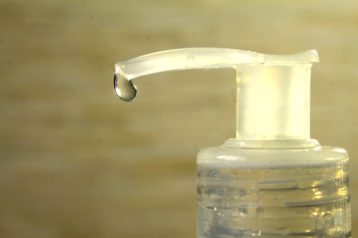

Go down to the basement, crawl space or room directly beneath this musty room to look for evidence of water leaks there, too-those could point to leaks that are hard to spot in the room above. Visit the room during the next hard rain to look for visible leaks. Look behind refrigerators and under sinks for wet spots. Meanwhile, search these rooms for water leaks. Apply an antimicrobial spray to carpets, curtains and fabric-covered furniture in any room that has high humidity and/or a musty odor. If you get readings above 50%, run a dehumidifier. Use a digital hygrometer to check the relative humidity of each room in the house-you can find these for less than $10 online or at home-improvement stores. This usually signals mold or mildew, which could become a big problem for both your home and your health if not quickly remedied. If you use poison, additional rodents might die in their hard-to-reach nests inside your home, creating more bad smell. Also, deploy rodent traps-not rodent poison-in the home. Meanwhile, inspect the perimeter of your home for gaps where rodents can enter, and seal these to prevent further invasions. Of course, you could just wait for the smell to go away, which typically takes a few weeks. Unfortunately, even with a snaking camera, you won’t be able to see everywhere without drilling holes in walls, and that usually causes more problems than it solves. Ridgid Hand-Held inspection cameras are a good choice, starting at less than $150. Consider buying and using a small snaking digital inspection camera to peek into walls, behind cabinets and appliances and into other tight spots. Use your nose to find where the smell is strongest, and search everywhere you can in that area. One solution is to find and remove the corpse, and that’s often easier said than done-there’s a good chance that it is in a hard-to-reach spot inside your walls, ceiling or floor. Some people describe this as the smell of death, and they’re right-a mouse or some other small animal likely has died inside your home.

Warning: If the odor seems to be emanating from a wall switch, outlet or some other part of your home’s electrical wiring, not an appliance, switch off the circuit breaker and call an electrician. When you think you have found the source, either call in a repair professional to investigate… or replace the appliance if it is approaching the end of its useful life. Sniff near each of these while they are running to try to identify the source. The most likely culprit is an appliance, such as a dishwasher, washing machine or an air conditioner. This could be something electrical in the home overheating and melting its insulating plastic or rubber-which could lead to a fire. Some people refer to this as a urine or burning rubber smell.


 0 kommentar(er)
0 kommentar(er)
